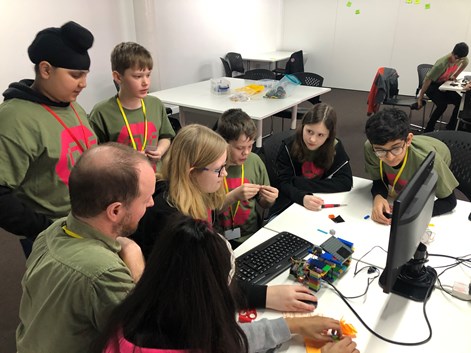
BLOG: Go Digital inspiring young people
How the Go Digital programme has been inspiring young people In Greater Manchester to consider careers in the digital sector.
By Damian Payton, Founder, Hive Learning Network
 As part of the Greater Manchester Digital Blueprint the GMCA set out their vision to develop a future talent pipeline in Greater Manchester. The Go Digital Programme was set up to help deliver this ambition, by giving 11-13 year olds the chance to create digital products, experience the buzz of working in the digital sector and try their hand at a digital job.
As part of the Greater Manchester Digital Blueprint the GMCA set out their vision to develop a future talent pipeline in Greater Manchester. The Go Digital Programme was set up to help deliver this ambition, by giving 11-13 year olds the chance to create digital products, experience the buzz of working in the digital sector and try their hand at a digital job.
To create Go Digital, three Greater Manchester digital skills organisations came together: Hive, Digital Advantage and InnovateHer. All three organisations are working towards the same goal of demystifying the digital and technology industry for young people, helping them develop the skills and confidence to pursue a career in the industry.
Go Digital targets ages 11-13 because it allows us to engage with students before they chose their GCSE options, giving young people an early chance to see the jobs they could do and choose subjects or activities that will help them get there.
The 50 schools chosen to participant in Go Digital were chosen because their students had not had the chance to participate in an activity like this before.
- Over 90% of them were in areas where there is not currently high employment in digital.
- 50% of participants in the programme were girls, rising to 75% in the final phase because we aim to tackle the starkest problem in the tech industry: the underrepresentation of women.
Project Outcomes

We were delighted to reach 9000 students from 50 Greater Manchester schools across all boroughs, through the delivery of digital assembly’s which highlighted the different roles and personalities needed in the digital sector, from calm problem-solvers to team-leading extroverts, from tech lovers to creative designers.
We then had 1500 students take part in a 1-day ‘design sprint’ where, in teams, they coded robots and made a video and website to bring them to life as a product.
400 pupils also went on to spend 3 days out of school at the Federation in Manchester, forming teams with people from other schools to create an app, website or gadget to help people or solve a real-world problem.
The teacher and student feedback we gathered was extremely positive. Teacher feedback highlighted how engaged the students were and how they thrived by working with industry experts to solve problems. All participants said that they now better understood the digital opportunities open to them, and many told us they would now make subject choices leading to digital careers.
Some feedback included:
“I knew I was quite good at tech but I never really considered it because I didn’t know what type of jobs there were - but now I do.” - Hollingworth Academy student (Rochdale)
“I definitely feel way more confident and we’ve learnt a lot about how women can get into tech.” - Westleigh student (Wigan)
“I think for our students it’s really important to see all kinds of careers that are quite new and our staff don’t necessarily know about.” - Coop Academy teacher (Manchester)
“My favourite part is working with another school because there’s not many where I’m from and so it’s nice to make bonds.” - Smithills student (Bolton)
The COVID-19 impact
Go Digital’s face-to-face delivery had to stop in March 2020, as schools closed and people were no longer allowed to gather in groups. We had to flex to online delivery, which luckily, we had the skills and resources to do.
For now, we cannot work in schools, as they help students catch up with missed work and restrict external providers. We can gather our own groups of young people again, in a safe environment, but will have to adapt activity and reduce numbers. All three partners are developing online versions of their existing programmes and expect to deliver remotely to students and schools in the mid to long term.
As for working with tech employers, in the short term there is a pause as we all assess the economic situation. In the long-term, we believe there will be even more need for our work, as Covid-19 has made work and social activity more remote and digital. Companies and organisations providing digital services will need the skilled people to do it.
Closing the Digital Divide- next steps
We know that the need for digital inclusion will only grow as we move online to learn, work, shop, socialise and access services. We are keeping a close eye on where the greatest need is and will adapt our delivery to suit. We are conscious of the digital divide widening and have introduced measures to ensure young people can still access our programmes remotely.
Projects like Go Digital, are helping to plug the gaps in the curriculum and provide much-needed links to industry. Moving forward it is clear that more sustainable initiatives are needed to help close the digital divide. New initiatives are also needed to target older age groups, to sustain and develop interest and skills between the ages of 14 and 18. As ever, employers, local authorities and learning providers need to find ways to understand each other better and work together, in these times of challenge and opportunity.
Digitober is a month focused on bringing together businesses from across Greater Manchester to combat digital exclusion and close the digital divide.
Find out more about Digitober and how your organisation can get involved
Article Published: 23/10/2020 11:33 AM



